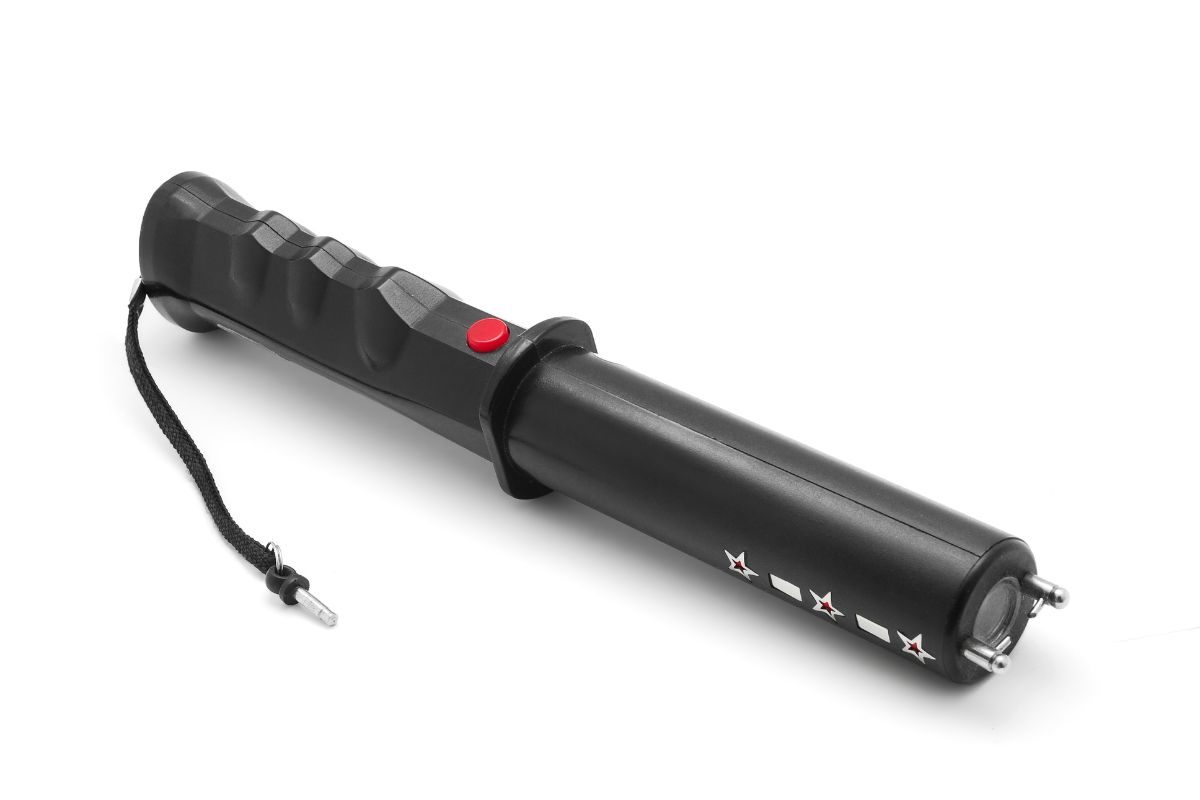In Canada, stun guns and tasers are classified as banned weapons under section 84(1) of the Criminal Code and its regulations.
This article delves into the legal intricacies surrounding stun guns and tasers, exploring their classification, the implications of their use in self-defence, the prohibition on possession, associated penalties, and the importance of legal representation when facing charges. For a broader overview of how weapons are classified and regulated, see our guide to Gun Laws in Canada.
If you are facing weapons charges, you need a criminal defence lawyer to look at your case as soon as possible. A conviction can carry serious penalties including expensive fines and jail time.
What weapons are classified as stun guns and tasers?
Stun guns and Tasers, though both designed for a similar purpose, differ in their mechanisms and effective ranges. Stun guns are close-proximity devices, requiring physical proximity to the attacker. They deliver a painful shock upon contact to discourage further aggression. On the contrary, a taser operates from a distance of up to 15 feet, utilizing projectile prongs that spread out upon firing. This design allows the prongs to land on different body parts, facilitating the transmission of electricity across a broader area.
While both devices deliver a painful shock, a taser’s shape resembles a traditional firearm more than a typical stun gun. The effectiveness of a taser lies in its ability to incapacitate muscle functions, rendering an attacker immobile. However, the projectile nature of a taser limits its use to one or two shots before requiring a cartridge swap, which can be costly. In contrast, most stun guns rely on a rechargeable battery and lack projectiles, allowing extended use as long as the battery remains charged.
What happens if I use stun guns and tasers to defend myself?
Using stun guns and tasers for self-defence in Canada is illegal due to their prohibited status. While the Criminal Code allows for the use of reasonable force in self-defence, the use of banned weapons, including stun guns and tasers, may lead to serious criminal charges. It is vital to recognize the legal boundaries, explore alternative means of self-protection within the confines of the law, and seek appropriate legal guidance if faced with charges related to their possession or use.
Who can legally carry stun guns and tasers?
The possession of stun guns and tasers is explicitly illegal for all individuals in Canada. The categorical ban emphasizes the stringent approach to the possession of these weapons, irrespective of one’s background or intent. Similar limits apply to other items people often ask about, such as batons.
What is the penalty for owning stun guns and tasers?
Section 91(2) of the Criminal Code makes it unequivocally clear that possessing prohibited or restricted weapons, including stun guns and tasers, is a criminal offence. If found in possession of stun guns and tasers, an individual may face either a summary offence or an indictable offence. The potential penalty includes imprisonment for a term not exceeding 5 years. Understanding the gravity of this offence underscores the importance of compliance with the ban on stun guns and tasers.
- Summary Offence: Summary offences are characterized as less serious offences and carry lesser penalties or sentences. If you have been charged with a summary offence, the Police are allowed to arrest you without a warrant. Additionally, s.787(1) of the Criminal Codespecifies that, unless otherwise indicated, the maximum punishment for a summary conviction offence is 2 years less one-day imprisonment and/or a fine of $5,000.00. All summary offences are tried in the Provincial Court with no jury and the accused does not have the liberty to have a preliminary hearing or to be tried in a higher court. Furthermore, any appeals for summary offences are made to the next highest court, the Superior Court. Lastly, unlike indictable offences, for summary offences, there does exist a statute of limitation. As per s.786(2) of the Criminal Code, there is a 12-month limitation period from the time of the commission of the offence for a charge to be laid.
- Indictable Offence: Indictable offences are more serious and are generally heard in superior court with the potential for a trial by judge and jury. If charged with an indictable offence related to stun guns and tasers possession, an individual may face imprisonment for a term not exceeding 5 years.
The decision to proceed summarily or by indictment is often at the discretion of the Crown prosecutor and may depend on the severity of the alleged offence and other factors.
When should I hire a lawyer?
If you find yourself in a situation where legal issues related to stun guns and tasers arise, seeking legal representation becomes imperative. Given the categorical ban on these weapons, navigating the legal system demands the expertise of a qualified criminal defence lawyer. A lawyer can assess the specifics of the case, provide guidance, and advocate on behalf of the individual facing charges related to the possession or use of stun guns and tasers.
Conclusion
The legal status of stun guns and tasers in Canada is unequivocal—they are banned weapons, and their possession, use, and importation are strictly prohibited under the Criminal Code. Understanding the nuances of their classification, the implications of their use in self-defence, the categorical ban on possession, and the potential penalties for ownership is crucial. For individuals entangled in legal issues related to stun guns and tasers, securing legal representation is not just advisable; it is a fundamental step toward navigating the complexities of the legal system and safeguarding one’s rights.








